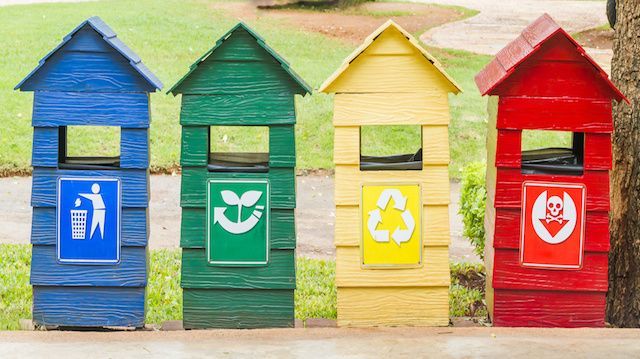
Recycling is a word loaded with meaning, and one that evokes sometimes drastically diverse opinions and responses from different people. While the actual definition and process of recycling is relatively straightforward, there is often a lot of contention surrounding overall effectiveness and whether it’s the best solution for managing waste.
With the world population expanding at an alarming rate, the question of what to do with the ever-increasing mountains of waste created by mankind remains a burning one. Here, we examine the advantages and disadvantages of recycling to determine whether it really is something worth standing behind in our fight to save the planet.
Pro: Recycling saves energy
A vast amount of energy is expended in the process of manufacturing goods and products, be they composed of plastics, metals, ceramics, wood or glass. New products have a huge life-cycle energy consumption, particularly with regards to mining the materials needed to make the product, refining them to create the building blocks of the end product, manufacturing with energy-dependent machinery and transporting them to wholesalers.
Recycling cuts out the first two of these processes, meaning a new product can be made using the pre-mined and pre-refined materials of an old product or good. When considering the amount of goods that can be recycled this way, it’s a huge reduction in energy consumption, which helps to lower our overall carbon footprint and minimize our impact on climate change.
Con: It’s not particularly cost-effective
While recycling has a wide range of benefits, cost-effectiveness is not one of them. The cost of establishing facilities for processing recycled goods, transporting them, cleaning them and storing waste earmarked for recycling can be considerable, and this cost often limits the ability of certain economies to effectively implement it.
Recycling is also dependent on market demand. This means that when the demand for certain materials — such as glass — is low, recycling organizations must have a way to store this glass until the demand for glass increases again. Until this point, processing the glass would not turn a profit for the recycler and would therefore not be cost-effective. For this reason, recyclers are often forced to find long-term storage for these materials, which can place a burden on the land and a further cost on the organization.
Pro: It’s environmentally friendly
As mentioned above, recycling reduces the demand for new, raw materials. This means there is less reliance on trees, minerals, petroleum and other finite resources. The result is a reduction in deforestation, as second-hand wood can be repeatedly recycled to make new products; a reduction in mining operations, which can otherwise destroy large tracts of land and leach toxins into the surrounding soil; and a reduction in oil consumption, which pollutes the atmosphere.
Con: Recycled products are less durable
While the idea of buying recycled products is a good one, in practice it doesn’t always work out as intended. Many recycled products are made from waste stores that have been allowed to sit for long periods of time, exposed to the elements and slowly degrading. Other waste materials have been subjected to repeated use and recycling over their lifetime, making them more and more fragile each time.
The result is these materials are often less durable than their raw counterparts, meaning the resulting recycled products aren’t as robust as the new products. This implies that recycled products should be cheaper than new products made from raw materials; however, due to the high overhead costs of recycling, this can’t always be the case.
Pro: Reduction in pollution
This one may seem like a bit of a no-brainer, but it’s a huge benefit of recycling nonetheless: It reduces waste. When you recycle, you reduce the amount of waste you create, as you’re essentially renewing the life of whatever good or product you would otherwise have thrown out.
As a rule of thumb, most products that can be recycled are otherwise very difficult to break down naturally over time. This means that plastics, metals and other synthetic materials have to either be buried or burned, which pollutes either the land by leaching chemicals into the soil or the atmosphere by releasing toxic gases into the air during the process of combustion. This kind of pollution is completely pointless, as recycling offers a way to reuse these hard-earned materials and avoid creating waste and pollution at the same time.
Con: It takes more effort
It’s a sad fact of life that many people are just too lazy to recycle. Recycling requires more effort than just throwing something in the trash can, as recycling items often need to be sorted, cleaned and placed in separate bins. There really isn’t much excuse for not taking a bit of extra effort to recycle, but often it’s this small additional step that puts people off from recycling. The result is that while recycling may be available in a given town or city, a lot of people don’t utilize it, as they simply can’t be bothered.
As you can see from the above, the cons of recycling ain’t got nothing on the pros. Recycling is an effective way to do your part for the environment, and if your hometown provides a recycling program, get involved and do your part!
—Liivi Hess
Liivi is an Integrative Nutrition Health Coach and is training to become a doula. She inspires women to find peace and personal power by taking control of health and fertility naturally. Liivi‘s passion is ancestral nutrition and primal lifestyle design. She and her partner Will live between Toronto, Canada and Queenstown, New Zealand.
Sources:
http://onlinelibrary.wiley.com/doi/10.1111/j.1559-1816.1986.tb02276.x/abstract
http://www.sciencedirect.com/science/article/pii/S0921344912001760
http://www.tandfonline.com/doi/abs/10.1080/00958964.1996.9941471#.VxcmVDArLNM

